- Home
- Roald Dahl
Trickery
Trickery Read online
Roald Dahl
* * *
TRICKERY
Contents
The Wish
Beware of the Dog
Champion of the World
The Visitor
Mrs Bixby and the Colonel’s Coat
Claud’s Dog: Rummins
Claud’s Dog: Mr Hoddy
The Hitch-hiker
The Surgeon
Princess Mammalia
Follow Penguin
PENGUIN BOOKS
TRICKERY
Roald Dahl is best known for his mischievous, wildly inventive stories for children. But throughout his life he was also a prolific and acclaimed writer of stories for adults. These sinister, surprising tales continue to entertain, amuse and shock generations of readers even today.
The Wish
First published in Someone Like You (1953)
Under the palm of one hand the child became aware of the scab of an old cut on his knee-cap. He bent forward to examine it closely. A scab was always a fascinating thing; it presented a special challenge he was never able to resist.
Yes, he thought, I will pick it off, even if it isn’t ready, even if the middle of it sticks, even if it hurts like anything.
With a fingernail he began to explore cautiously around the edges of the scab. He got the nail underneath it, and when he raised it, but ever so slightly, it suddenly came off, the whole hard brown scab came off beautifully, leaving an interesting little circle of smooth red skin.
Nice. Very nice indeed. He rubbed the circle and it didn’t hurt. He picked up the scab, put it on his thigh and flipped it with a finger so that it flew away and landed on the edge of the carpet, the enormous red and black and yellow carpet that stretched the whole length of the hall from the stairs on which he sat to the front door in the distance. A tremendous carpet. Bigger than the tennis lawn. Much bigger than that. He regarded it gravely, settling his eyes upon it with mild pleasure. He had never really noticed it before, but now, all of a sudden, the colours seemed to brighten mysteriously and spring out at him in a most dazzling way.
You see, he told himself, I know how it is. The red parts of the carpet are red-hot lumps of coal. What I must do is this: I must walk all the way along it to the front door without touching them. If I touch the red I will be burned. As a matter of fact, I will be burned up completely. And the black parts of the carpet … yes, the black parts are snakes, poisonous snakes, adders mostly, and cobras, thick like tree-trunks round the middle, and if I touch one of them, I’ll be bitten and I’ll die before teatime. And if I get across safely, without being burned and without being bitten, I will be given a puppy for my birthday tomorrow.
He got to his feet and climbed higher up the stairs to obtain a better view of this vast tapestry of colour and death. Was it possible? Was there enough yellow? Yellow was the only colour he was allowed to walk on. Could it be done? This was not a journey to be undertaken lightly; the risks were too great for that. The child’s face – a fringe of white-gold hair, two large blue eyes, a small pointed chin – peered down anxiously over the banisters. The yellow was a bit thin in places and there were one or two widish gaps, but it did seem to go all the way along to the other end. For someone who had only yesterday triumphantly travelled the whole length of the brick path from the stables to the summer-house without touching the cracks, this carpet thing should not be too difficult. Except for the snakes. The mere thought of snakes sent a fine electricity of fear running like pins down the backs of his legs and under the soles of his feet.
He came slowly down the stairs and advanced to the edge of the carpet. He extended one small sandalled foot and placed it cautiously upon a patch of yellow. Then he brought the other foot up, and there was just enough room for him to stand with the two feet together. There! He had started! His bright oval face was curiously intent, a shade whiter perhaps than before, and he was holding his arms out sideways to assist his balance. He took another step, lifting his foot high over a patch of black, aiming carefully with his toe for a narrow channel of yellow on the other side. When he had completed the second step he paused to rest, standing very stiff and still. The narrow channel of yellow ran forward unbroken for at least five yards and he advanced gingerly along it, bit by bit, as though walking a tightrope. Where it finally curled off sideways, he had to take another long stride, this time over a vicious-looking mixture of black and red. Halfway across he began to wobble. He waved his arms around wildly, windmill fashion, to keep his balance, and he got across safely and rested again on the other side. He was quite breathless now, and so tense he stood high on his toes all the time, arms out sideways, fists clenched. He was on a big safe island of yellow. There was lots of room on it, he couldn’t possibly fall off, and he stood there resting, hesitating, waiting, wishing he could stay for ever on this big safe yellow island. But the fear of not getting the puppy compelled him to go on.
Step by step, he edged farther ahead, and between each one he paused to decide exactly where next he should put his foot. Once, he had a choice of ways, either to left or right, and he chose the left because although it seemed the more difficult, there was not so much black in that direction. The black was what made him nervous. He glanced quickly over his shoulder to see how far he had come. Nearly halfway. There could be no turning back now. He was in the middle and he couldn’t turn back and he couldn’t jump off sideways either because it was too far, and when he looked at all the red and all the black that lay ahead of him, he felt that old sudden sickening surge of panic in his chest – like last Easter-time, that afternoon when he got lost all alone in the darkest part of Piper’s Wood.
He took another step, placing his foot carefully upon the only little piece of yellow within reach, and this time the point of the foot came within a centimetre of some black. It wasn’t touching the black, he could see it wasn’t touching, he could see the small line of yellow separating the toe of his sandal from the black; but the snake stirred as though sensing the nearness, and raised its head and gazed at the foot with bright beady eyes, watching to see if it was going to touch.
‘I’m not touching you! You mustn’t bite me! You know I’m not touching you!’
Another snake slid up noiselessly beside the first, raised its head, two heads now, two pairs of eyes staring at the foot, gazing at a little naked place just below the sandal strap where the skin showed through. The child went high up on his toes and stayed there, frozen stiff with terror. It was minutes before he dared to move again.
The next step would have to be a really long one. There was this deep curling river of black that ran clear across the width of the carpet, and he was forced by this position to cross it at its widest part. He thought first of trying to jump it, but decided he couldn’t be sure of landing accurately on the narrow band of yellow the other side. He took a deep breath, lifted one foot, and inch by inch he pushed it out in front of him, far far out, then down and down until at last the tip of his sandal was across and resting safely on the edge of the yellow. He leaned forward, transferring his weight to his front foot. Then he tried to bring the back foot up as well. He strained and pulled and jerked his body, but the legs were too wide apart and he couldn’t make it. He tried to get back again. He couldn’t do that either. He was doing the splits and he was properly stuck. He glanced down and saw this deep curling river of black underneath him. Parts of it were stirring now, and uncoiling and sliding and beginning to shine with a dreadfully oily glister. He wobbled, waved his arms frantically to keep his balance, but that seemed to make it worse. He was starting to go over. He was going over to the right, quite slowly he was going over, then faster and faster, and at the last moment, instinctively he put out a hand to break the fall and the next thing he saw was this bare hand of his going right into the
middle of a great glistening mass of black and he gave one piercing cry of terror as it touched.
Outside in the sunshine, far away behind the house, the mother was looking for her son.
Beware of the Dog
First published in Harper’s (October 1944)
Down below there was only a vast white undulating sea of cloud. Above there was the sun, and the sun was white like the clouds, because it is never yellow when one looks at it from high in the air.
He was still flying the Spitfire. His right hand was on the stick and he was working the rudder bar with his left leg alone. It was quite easy. The machine was flying well. He knew what he was doing.
Everything is fine, he thought. I’m doing all right. I’m doing nicely. I know my way home. I’ll be there in half an hour. When I land I shall taxi in and switch off my engine and I shall say, Help me to get out, will you. I shall make my voice sound ordinary and natural and none of them will take any notice. Then I shall say, Someone help me to get out. I can’t do it alone because I’ve lost one of my legs. They’ll all laugh and think that I’m joking and I shall say, All right, come and have a look, you unbelieving bastards. Then Yorky will climb up on to the wing and look inside. He’ll probably be sick because of all the blood and the mess. I shall laugh and say, For God’s sake, help me get out.
He glanced down again at his right leg. There was not much of it left. The cannon-shell had taken him on the thigh, just above the knee, and now there was nothing but a great mess and a lot of blood. But there was no pain. When he looked down, he felt as though he were seeing something that did not belong to him. It had nothing to do with him. It was just a mess which happened to be there in the cockpit; something strange and unusual and rather interesting. It was like finding a dead cat on the sofa.
He really felt fine, and because he still felt fine, he felt excited and unafraid.
I won’t even bother to call up on the radio for the blood-wagon, he thought. It isn’t necessary. And when I land I’ll sit there quite normally and say, Some of you fellows come and help me out, will you, because I’ve lost one of my legs. That will be funny. I’ll laugh a little while I’m saying it; I’ll say it calmly and slowly, and they’ll think I’m joking. When Yorky comes up on to the wing and gets sick, I’ll say, Yorky, you old son of a bitch, have you fixed my car yet? Then when I get out I’ll make my report. Later I’ll go up to London. I’ll take that half bottle of whisky with me and I’ll give it to Bluey. We’ll sit in her room and drink it. I’ll get the water out of the bathroom tap. I won’t say much until it’s time to go to bed, then I’ll say, Bluey I’ve got a surprise for you. I lost a leg today. But I don’t mind so long as you don’t. It doesn’t even hurt. We’ll go everywhere in cars. I always hated walking except when I walked down the street of the coppersmiths in Baghdad, but I could go in a rickshaw. I could go home and chop wood, but the head always flies off the axe. Hot water, that’s what it needs; put it in the bath and make the handle swell. I chopped lots of wood last time I went home and I put the axe in the bath …
Then he saw the sun shining on the engine cowling of his machine. He saw the sun shining on the rivets in the metal, and he remembered the aeroplane and he remembered where he was. He realized that he was no longer feeling good; that he was sick and giddy. His head kept falling forward on to his chest because his neck seemed no longer to have any strength. But he knew that he was flying the Spitfire. He could feel the handle of the stick between the fingers of his right hand.
I’m going to pass out, he thought. Any moment now I’m going to pass out.
He looked at his altimeter. Twenty-one thousand. To test himself he tried to read the hundreds as well as the thousands. Twenty-one thousand and what? As he looked the dial became blurred and he could not even see the needle. He knew then that he must bale out; that there was not a second to lose, otherwise he would become unconscious. Quickly, frantically, he tried to slide back the hood with his left hand, but he had not the strength. For a second he took his right hand off the stick and with both hands he managed to push the hood back. The rush of cold air on his face seemed to help. He had a moment of great clearness. His actions became orderly and precise. That is what happens with a good pilot. He took some quick deep breaths from his oxygen mask, and as he did so, he looked out over the side of the cockpit. Down below there was only a vast white sea of cloud and he realized that he did not know where he was.
It’ll be the Channel, he thought. I’m sure to fall in the drink.
He throttled back, pulled off his helmet, undid his straps and pushed the stick hard over to the left. The Spitfire dipped its port wing and turned smoothly over on to its back. The pilot fell out.
As he fell, he opened his eyes, because he knew that he must not pass out before he had pulled the cord. On one side he saw the sun; on the other he saw the whiteness of the clouds, and as he fell, as he somersaulted in the air, the white clouds chased the sun and the sun chased the clouds. They chased each other in a small circle; they ran faster and faster and there was the sun and the clouds and the clouds and the sun, and the clouds came nearer until suddenly there was no longer any sun but only a great whiteness. The whole world was white and there was nothing in it. It was so white that sometimes it looked black, and after a time it was either white or black, but mostly it was white. He watched it as it turned from white to black, then back to white again, and the white stayed for a long time, but the black lasted only for a few seconds. He got into the habit of going to sleep during the white periods, of waking up just in time to see the world when it was black. The black was very quick. Sometimes it was only a flash, a flash of black lightning. The white was slow and in the slowness of it, he always dozed off.
One day, when it was white, he put out a hand and he touched something. He took it between his fingers and crumpled it. For a time he lay there, idly letting the tips of his fingers play with the thing which they had touched. Then slowly he opened his eyes, looked down at his hand and saw that he was holding something which was white. It was the edge of a sheet. He knew it was a sheet because he could see the texture of the material and the stitchings on the hem. He screwed up his eyes and opened them again quickly. This time he saw the room. He saw the bed in which he was lying: he saw the grey walls and the door and the green curtains over the window. There were some roses on the table by his bed.
Then he saw the basin on the table near the roses. It was a white enamel basin and beside it there was a small medicine glass.
This is a hospital, he thought. I am in a hospital. But he could remember nothing. He lay back on his pillow, looking at the ceiling and wondering what had happened. He was gazing at the smooth greyness of the ceiling which was so clean and grey, and then suddenly he saw a fly walking upon it. The sight of this fly, the suddenness of seeing this small black speck on a sea of grey, brushed the surface of his brain, and quickly, in that second, he remembered everything. He remembered the Spitfire and he remembered the altimeter showing twenty-one thousand feet. He remembered the pushing back of the hood with both hands and he remembered the baling out. He remembered his leg.
It seemed all right now. He looked down at the end of the bed, but he could not tell. He put one hand underneath the bedclothes and felt for his knees. He found one of them, but when he felt for the other, his hand touched something which was soft and covered in bandages.
Just then the door opened and a nurse came in.
‘Hello,’ she said. ‘So you’ve waked up at last.’
She was not good-looking, but she was large and clean. She was between thirty and forty and she had fair hair. More than that he did not notice.
‘Where am I?’
‘You’re a lucky fellow. You landed in a wood near the beach. You’re in Brighton. They brought you in two days ago, and now you’re all fixed up. You look fine.’
‘I’ve lost a leg,’ he said.
‘That’s nothing. We’ll get you another one. Now you must go to sleep. The doctor
will be coming to see you in about an hour.’ She picked up the basin and the medicine glass and went out.
But he did not sleep. He wanted to keep his eyes open because he was frightened that if he shut them again everything would go away. He lay looking at the ceiling. The fly was still there. It was very energetic. It would run forward very fast for a few inches, then it would stop. Then it would run forward again, stop, run forward, and every now and then it would take off and buzz around viciously in small circles. It always landed back in the same place on the ceiling and started running and stopping all over again. He watched it for so long that after a while it was no longer a fly, but only a black speck upon a sea of grey, and he was still watching it when the nurse opened the door, and stood aside while the doctor came in. He was an Army doctor, a major, and he had some last-war ribbons on his chest. He was bald and small, but he had a cheerful face and kind eyes.
‘Well, well,’ he said. ‘So you’ve decided to wake up at last. How are you feeling?’
‘I feel all right.’
‘That’s the stuff. You’ll be up and about in no time.’
The doctor took his wrist to feel his pulse.
‘By the way,’ he said, ‘some of the lads from your squadron were ringing up and asking about you. They wanted to come along and see you, but I said that they’d better wait a day or two. Told them you were all right and that they could come and see you a little later on. Just lie quiet and take it easy for a bit. Got something to read?’ He glanced at the table with the roses. ‘No. Well, Nurse will look after you. She’ll get you anything you want. With that he waved his hand and went out, followed by the large clean nurse.
When they had gone, he lay back and looked at the ceiling again. The fly was still there and as he lay watching it he heard the noise of an aeroplane in the distance. He lay listening to the sound of its engines. It was a long way away. I wonder what it is, he thought. Let me see if I can place it. Suddenly he jerked his head sharply to one side. Anyone who has been bombed can tell the noise of a Junkers 88. They can tell most other German bombers for that matter, but especially a Junkers 88. The engines seem to sing a duet. There is a deep vibrating bass voice and with it there is a high-pitched tenor. It is the singing of the tenor which makes the sound of a Ju-88 something which one cannot mistake.

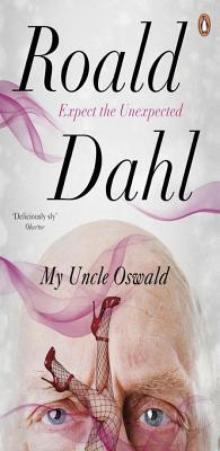 My Uncle Oswald
My Uncle Oswald The Best of Roald Dahl
The Best of Roald Dahl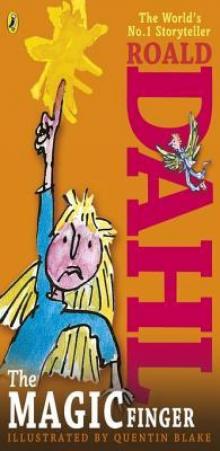 The Magic Finger
The Magic Finger Charlie and the Chocolate Factory
Charlie and the Chocolate Factory Fantastic Mr Fox
Fantastic Mr Fox Matilda
Matilda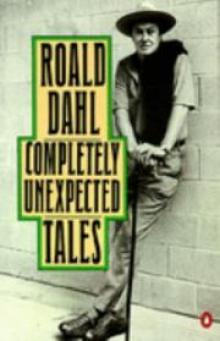 Completely Unexpected Tales: Tales of the Unexpected. More Tales of the Unexpected
Completely Unexpected Tales: Tales of the Unexpected. More Tales of the Unexpected The Wonderful Story of Henry Sugar and Six More
The Wonderful Story of Henry Sugar and Six More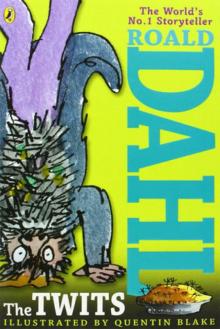 The Twits
The Twits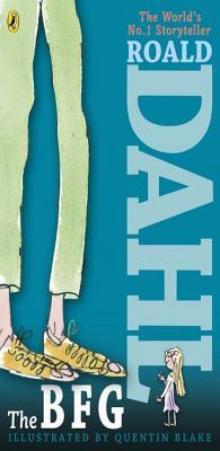 The BFG
The BFG Danny the Champion of the World
Danny the Champion of the World The Witches
The Witches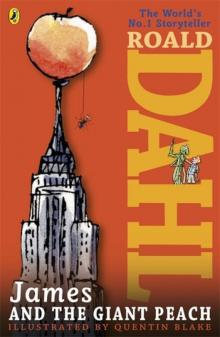 James and the Giant Peach
James and the Giant Peach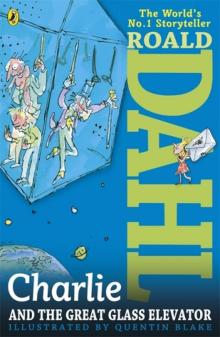 Charlie and the Great Glass Elevator
Charlie and the Great Glass Elevator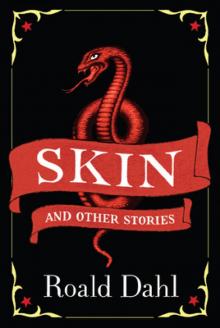 Skin and Other Stories
Skin and Other Stories Kiss Kiss
Kiss Kiss Switch Bitch
Switch Bitch The Giraffe and the Pelly and Me
The Giraffe and the Pelly and Me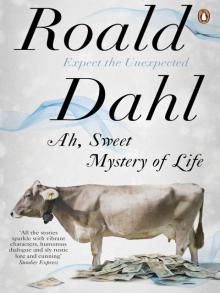 Ah, Sweet Mystery of Life
Ah, Sweet Mystery of Life Fear
Fear The Great Automatic Grammatizator and Other Stories
The Great Automatic Grammatizator and Other Stories Someone Like You
Someone Like You Charlie and the Great Glass Elevator c-2
Charlie and the Great Glass Elevator c-2 More About Boy
More About Boy Tales of the Unexpected
Tales of the Unexpected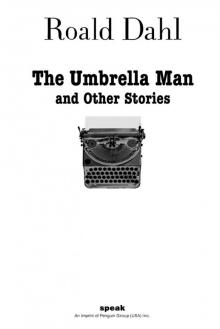 The Umbrella Man and Other Stories
The Umbrella Man and Other Stories Dirty Beasts
Dirty Beasts Roald Dahl's Mischief and Mayhem
Roald Dahl's Mischief and Mayhem The Collected Short Stories of Roald Dahl, Volume 1
The Collected Short Stories of Roald Dahl, Volume 1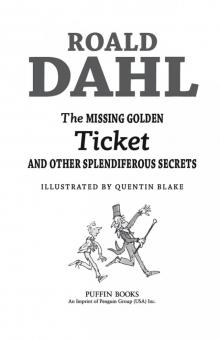 The Missing Golden Ticket and Other Splendiferous Secrets
The Missing Golden Ticket and Other Splendiferous Secrets Billy and the Minpins
Billy and the Minpins Over to You
Over to You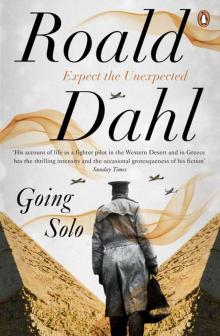 Going Solo
Going Solo Deception
Deception War
War Man from the South ee-3
Man from the South ee-3 More Tales of the Unexpected
More Tales of the Unexpected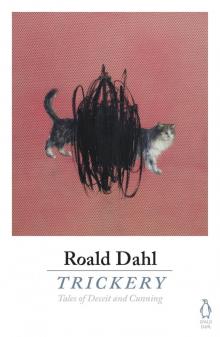 Trickery
Trickery Rhyme Stew
Rhyme Stew Charlie and the Chocolate Factory (Puffin Modern Classics relaunch)
Charlie and the Chocolate Factory (Puffin Modern Classics relaunch)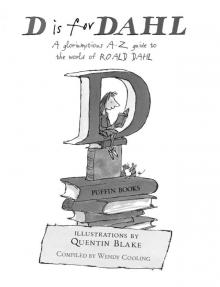 D is for Dahl
D is for Dahl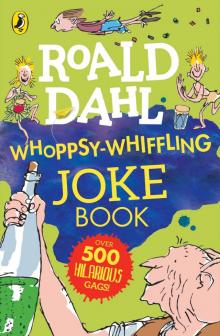 Roald Dahl Whoppsy-Whiffling Joke Book
Roald Dahl Whoppsy-Whiffling Joke Book Spotty Powder and other Splendiferous Secrets
Spotty Powder and other Splendiferous Secrets Charlie and the Chocolate Factory c-1
Charlie and the Chocolate Factory c-1 Boy
Boy Completely Unexpected Tales
Completely Unexpected Tales Madness
Madness Innocence
Innocence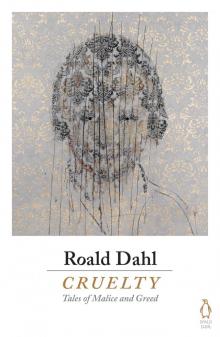 Cruelty
Cruelty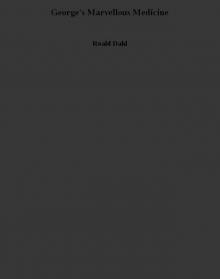 George's Marvellous Medicine
George's Marvellous Medicine